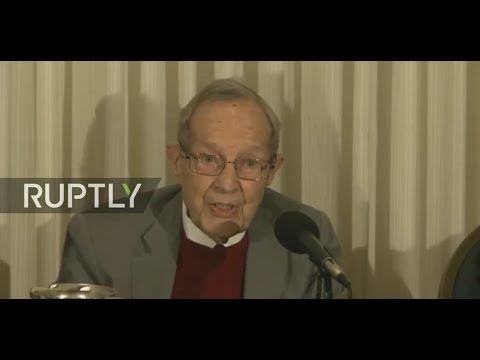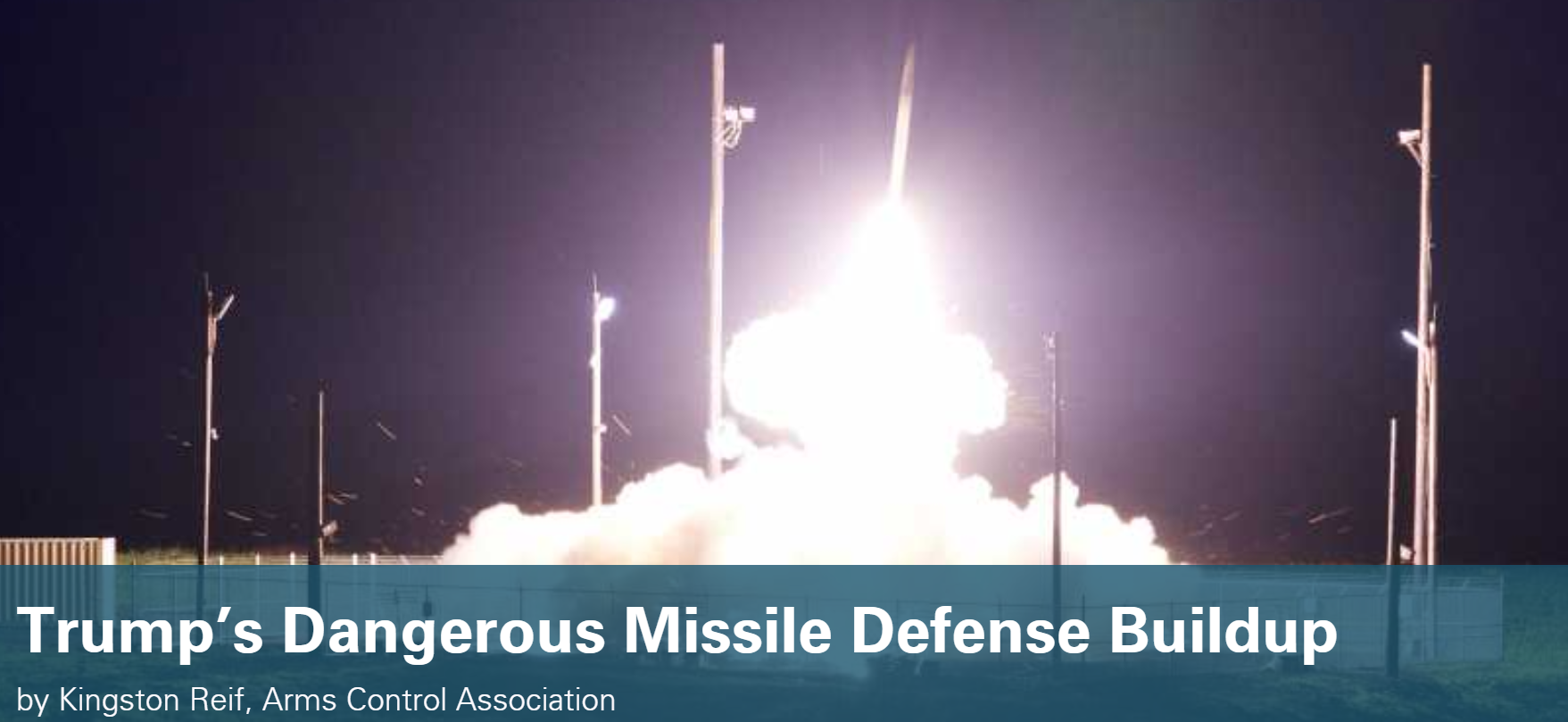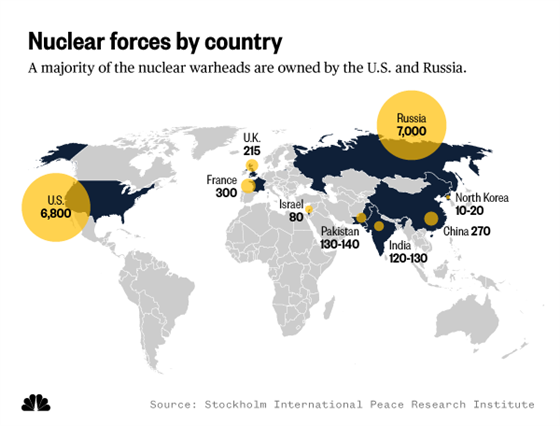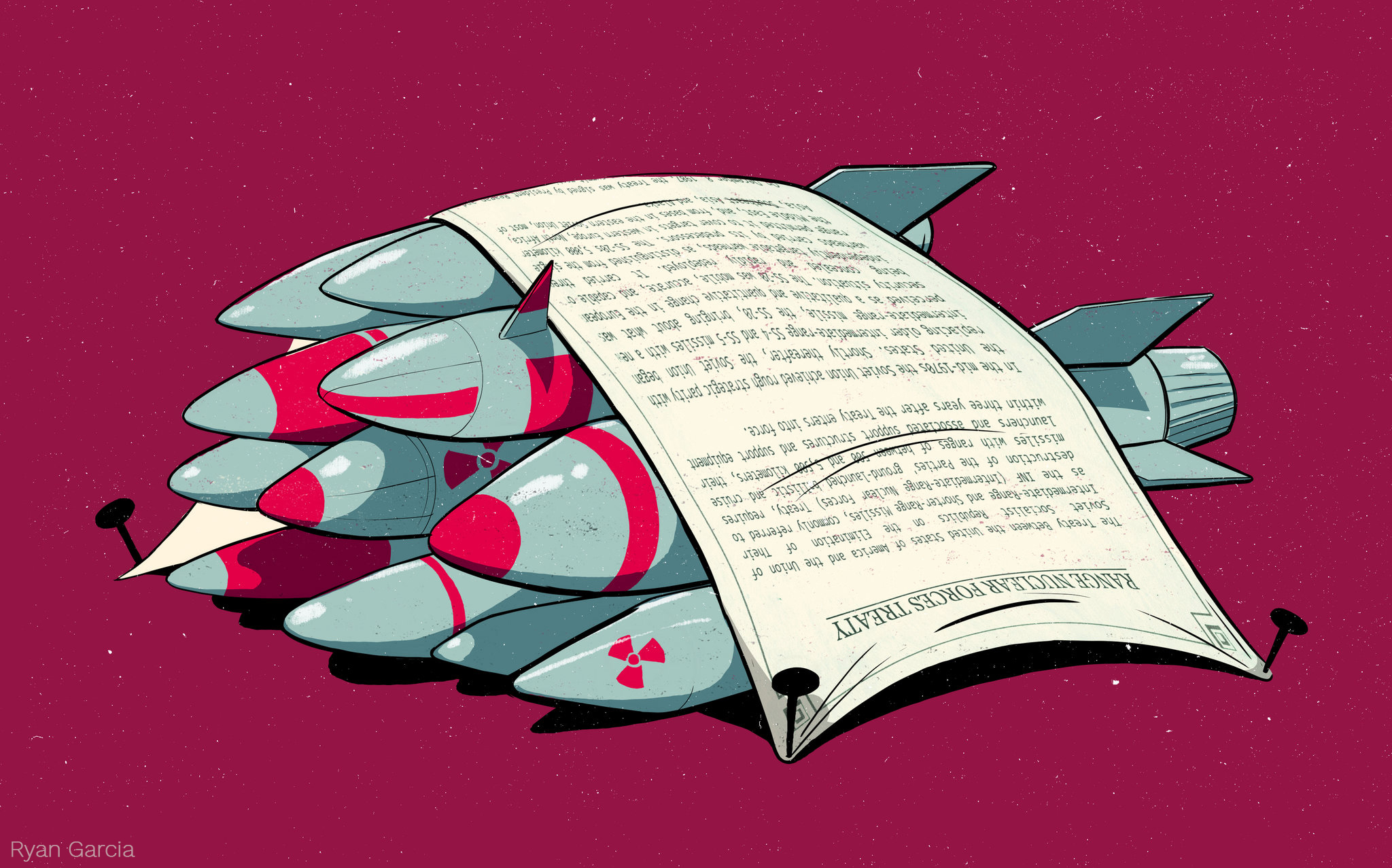2023 News Articles – All Posts
Nothing Found
It seems we can’t find what you’re looking for. Perhaps searching can help.
2022 Select Highlighted Press Items
Nuclear Modernization is the ’Absolute Minimum,’ STRATCOM Commander Says | March 8, 2022
US tested hypersonic missile in mid-March but kept it quiet to avoid escalating tensions with Russia | April 4, 2022
Putin’s Nuclear Threats Are a Wake-Up Call for the World | March 15, 2022
Intelligence report determines that Russia's WMD threats will grow as losses mount in Ukraine | March 19, 2022
China and the United States: It’s a Cold War, but don’t panic | March 10, 2022
Russian military doctrine calls a limited nuclear strike “de-escalation.” Here’s why. | March 8, 2022
North Korea says it will strike with nuclear weapons if South attacks | April 4, 2022
Flying Under The Radar: A Missile Accident in South Asia | April 4, 2022
2022 News Articles
Chairman Smith, Senator Warren Introduce Bill Establishing “NO FIRST USE” Policy for Nuclear Weapons
 armedservices.house.gov | WASHINGTON DC January 30th, 2019
armedservices.house.gov | WASHINGTON DC January 30th, 2019
Today, Representative Adam Smith (D-WA), Chairman of the House Armed Services Committee, and United States Senator Elizabeth Warren (D-MA), a member of the Senate Armed Services Committee, introduced the bicameral No First Use Act, to establish in law that it is the policy of the United States not to use nuclear weapons first.
Today the United States explicitly retains the option to be the first to use nuclear weapons in a conflict, even in response to a non-nuclear attack. The No First Use Act would codify what most Americans already believe—that the United States should never initiate a nuclear war.
“Our current nuclear strategy is not just outdated—it is dangerous,” said the lawmakers in a joint statement. “By making clear that deterrence is the sole purpose of our arsenal, this bill would reduce the chances of a nuclear miscalculation and help us maintain our moral and diplomatic leadership in the world.”
The No First Use Act would strengthen U.S. national security by:
– Reducing the risk of a nuclear miscalculation by an adversary during a crisis
– Strengthening our deterrence and increasing strategic stability by clarifying our declaratory policy
– Preserving the U.S. second-strike capability to retaliate against any nuclear attack on the U.S. or its allies
Since there has been no public release by the National Nuclear Security Administration (NNSA) of an outline of plans about activities to shutter the Mixed Oxide Fuel Fabrication Facility (MFFF) at DOE’s Savannah River Site (SRS) in South Carolina, the public remains in the dark about MOX closure plans. A Freedom of Information Act request has been filed by Savannah River Site Watch (SRS Watch) for the “Statement of Work” that DOE has contracted with Savannah River Nuclear Solutions for project closure.
Trump is Fixating on Another ‘Wall’ That Will Almost Certainly Fail to Live Up to his Promises
BY THE TIMES EDITORIAL BOARD | latimes.com
In 1983, in what came to be known as his “Star Wars” speech, President Ronald Reagan unveiled an ambitious vision for a missile defense system that would render the need for traditional nuclear deterrence unnecessary. Reagan asked: “What if free people could live secure in the knowledge that their security did not rest upon the threat of instant U.S. retaliation to deter a Soviet attack, that we could intercept and destroy strategic ballistic missiles before they reached our own soil or that of our allies?”
The “Star Wars” label proved prophetic, because Reagan’s vision of an impermeable shield that would deflect incoming nuclear missiles proved to be the stuff of science fiction. Missile defense has achieved modest successes, but it also has been marked by embarrassing failures.
Comment by the Information and Press Department on Space-based Elements Outlined in the US Missile Defence Review
mid.ru | We have taken note that in the US Missile Defence Review (MDR) published on January 17, a serious emphasis is placed on the formation of a space-based missile defence group, including missile interceptors. Deployment of such systems in space is ostensibly designed to make it easier to destroy different types of missiles in the boost phase over enemy territory. To achieve this, the US Defence Department has been instructed to study the most advanced technology, as well as draw up a time schedule, costs and personnel requirements.
We consider this to be further evidence (on a par with the decision to create space-based armed forces and the allocation of funds for the development of space-based missile defence) of Washington’s real intention to use outer space for combat operations and ensuring US domination in space in the near future. We are deeply disappointed that instead of developing constructive dialogue on the issues of strategic stability and preventing an arms race in space the US preferred to return to the implementation of yet another version of Ronald Reagan’s Star Wars programme.
A new abnormal: It is still 2 minutes to midnight
Humanity now faces two simultaneous existential threats, either of which would be cause for extreme concern and immediate attention. These major threats—nuclear weapons and climate change—were exacerbated this past year by the increased use of information warfare to undermine democracy around the world, amplifying risk from these and other threats and putting the future of civilization in extraordinary danger.
There is nothing normal about the complex and frightening reality just described.
Doomsday Clock Stays at Two Minutes to Midnight as Crisis Now ‘New Abnormal’
Warning that ‘We are like passengers on the Titanic, ignoring the iceberg ahead’ in face of nuclear arms and climate change threats
The former California governor Jerry Brown, left, and former US secretary of defence William Perry unveil the Doomsday Clock in Washington DC on Thursday. Photograph: Mark Wilson/Getty ImagesBY JULIAN BORGER in Washington | – theguardian.com |
The risk to global civilisation from nuclear weapons and climate change remains at an all-time high, according to a group of prominent US scientists and former officials, who said the world’s predicament had become the “new abnormal”.
The Bulletin of the Atomic Scientists announced that its symbolic “doomsday clock”, unveiled every year, was stuck at two minutes to midnight, the same as last January. The only other time the Bulletin has judged the world as being this close to catastrophe was 1953, in the early volatile stages of the cold war.
The reasons given by the Bulletin’s panel of experts included the collapse of arms control treaties, and the emphasis in Washington and Moscow on modernising nuclear arsenals rather than dismantling them, and the lack of political will to reverse climate change.
“We are like passengers on the Titanic, ignoring the iceberg ahead, enjoying the fine food and music,” said Jerry Brown, the former governor of California, said. Since leaving office this month, Brown has become the Bulletin’s executive chairman, citing the imminent threats to humanity. “It’s late and it’s getting later. We have to wake people up. And that’s what I intend to do!”
Watchdogs Fight WIPP Permit Change
By Rebecca Moss santafenewmexican.com | Jan 17, 2019 Updated Jan 18, 2019
Nuclear watchdog organizations filed an appeal Thursday of a state Environment Department-approved permit change they say could allow for 30 percent more nuclear waste to be held at a Southern New Mexico storage site.
The request for a New Mexico Court of Appeals review of the agency’s decision in December, which alters procedures for measuring the volume of waste at the Waste Isolation Pilot Plant near Carlsbad, was filed on behalf of Nuclear Watch New Mexico and the Southwest Research and Information Center.
The groups allege the permit change violates federal law by allowing plant managers to recalculate the amount of nuclear waste buried underground at WIPP without going through Congress.
The move subtly sidesteps nuclear waste limits outlined under the 1992 Land Withdrawal Act, the groups say.
‘Trump Could Hardly Have Chosen a Worse Moment’
In a DER SPIEGEL interview, German Foreign Minister Heiko Maas laments America’s rejection of multilateralism and says that Donald Trump does not view the U.S. as the leading power among liberal democracies. He’s hoping to save the INF.
Interview by CHRISTIANE HOFFMAN and CHRISTOPH SCHULT | spiegel.de
DER SPIEGEL: Mr. Minister, United States President Donald Trump has turned against a global order based on international rules and agreements. In response, you called for the creation of an “Alliance of Multilateralists” last summer. How is that alliance coming along?
Maas: It’s growing. Many countries are seriously concerned that the principle of might makes right is once again being applied internationally.
Donald Trump’s Space Missile Plan Is Too Expensive and Will Not Work, Just Like His Border Wall, Experts Say
President Donald Trump’s new global missile defense plan would be too expensive and technologically taxing to effectively implement, leading experts have said.
The president unveiled his 2019 Missile Defense Review, the first of its kind since 2010, during an address Thursday at the Pentagon. He pledged to virtually eliminate any external threat to the United States, vowing to “to ensure that we can detect and destroy any missile launched against the United States anywhere, anytime.”
Commenting on this statement specifically, Ploughshares Fund think tank director Joseph Cirincione said during a press call that this “is simple to say, impossible to do.”
“If you liked the president’s border wall, wait until you see his space wall,” Cirincione, who also served as a professional staff member of House Armed Services Committee and Government Operations Committee responsible for congressional oversight of missile defense programs in the 1980s and early 1990s, added. “This is a complete fantasy.”
Advocacy Groups Go to Court to Stop WIPP Waste Volume Accounting Change
“Rather than pursuing the permit modification, the Department of Energy should comply with the legal capacity limit and begin a public process to explain what additional waste it wants to bring to WIPP and how it intends to address the loss of disposal space that cannot be used because of the significant underground contamination,” said Scott Kovac, operations and research director of NukeWatch.
BY: WAYNE BARBER
Two advocacy groups in New Mexico filed a legal appeal Thursday seeking to undo a New Mexico Environment Department order that allows the Energy Department to change the way it records underground transuranic waste volume at its Waste Isolation Pilot Plant (WIPP) near Carlsbad.
The Southwest Research and Information Center (SRIC) and Nuclear Watch New Mexico (NWNM) filed their notice of appeal in the New Mexico Court of Appeals to block the modification to WIPP’s state hazardous waste permit.
While it technically takes effect this month, as a practical matter the new counting system won’t be instituted right away because DOE has not drafted its policy on implementation, said SRIC Administrator Don Hancock by email.
A Dec. 21 order from then-state Environment Department Secretary Butch Tongate authorized DOE to stop recording empty spaces between container drums as waste. The order adopted the findings of state Hearing Officer Max Shepherd, who recommended waste volume counted against the disposal cap set by the 1992 WIPP Land Withdrawal Act should cover only the actual waste inside containers.
Appeal Targets Permit Change for US Nuclear Repository
By Associated Press | Thursday, January 17th, 2019 at 12:33pm
ALBUQUERQUE, N.M. — Watchdog groups are appealing a recent permit change approval by New Mexico regulators that could ultimately allow for more waste to be placed at the U.S. government’s only underground nuclear waste repository.
The approval by the state Environment Department came in the final days of former Gov. Susana Martinez’s administration. The change was requested earlier by the U.S. Energy Department and the contractor that operates the Waste Isolation Pilot Plant.
The permit modification changes the way the volume of waste is calculated. Specifically, it excludes the empty space inside waste packaging containers.
The Southwest Research and Information Center and Nuclear Watch New Mexico argue the modification is unlawful.
Critics also are concerned the change could be a first step in expanding the repository’s mission to hold other kinds of waste.
Smith Statement on Trump Missile Defense Review
Washington, DC – Today, House Armed Services Committee Chairman Adam Smith (D-WA) released the following statement about the Trump administration’s Missile Defense Review:
“The missile defense policy of the United States must follow some key principles.”
“First, it is essential that we ensure we are spending money on programs that are reliable and rigorously tested before they are deployed. We need to know that we are putting scarce taxpayer dollars to good use, for example improving reliability of the current system, rather than rushing to buy and deploy unproven missile defense systems. It is common sense to insist on this principle when it comes to programs that protect the American people and our allies, particularly in the context of the growing North Korea threat.
“Second, we must avoid missile defense policies that will fuel a nuclear arms race. Strategic stability is an essential component of U.S. national security, and it does not serve our long-term interest to take steps that incentivize Russia and China to increase the number and capability of their nuclear weapons.
“While it is essential that we continue investing in proven missile defense efforts, I am concerned that this missile defense review could lead to greater investment in areas that do not follow these principles, such as a space-based interceptor layer that has been studied repeatedly and found to be technologically challenging and prohibitively expensive.
“Moreover, we must consider missile defense and effective arms control policy as part of our deterrence capabilities. I am gravely concerned about President Trump’s broader strategy to withdraw us from international arms control agreements, dismiss allies, and expand the role of nuclear weapons in U.S. defense policy, which could further siphon funding from much-needed budget priorities and exacerbate a new nuclear arms race.”
armscontrol.org | January 17th, 2019
The Trump administration’s long-awaited Missile Defense Review, which was released today, proposes a significant and costly expansion of the role and scope of U.S. missile defenses that is likely to exacerbate Russian and Chinese concerns about the threat to their strategic nuclear deterrents, undermine strategic stability, and further complicate the prospects for additional nuclear arms reductions.
Of particular concern was President Donald Trump’s statement during his remarks at the Pentagon that the goal of U.S. missile defenses is to “ensure we can detect and destroy any missile launched against the United States anywhere, anytime, anyplace.” This would be a costly, unachievable, and destabilizing departure from longstanding policy and contradicts the text of the review, which limits U.S. homeland missiles defense to their traditional role of defending against limited attacks from North Korea or Iran. Continue reading
US to Begin INF Treaty Pullout Next Month After Russia Missile Talks Fail
Officials reject Russian offer to inspect new missile; US says it will suspend observance of treaty on 2 February.
By JULIAN BORGER in Washington theguardian.com | Wed 16 Jan 2019 18.29 EST
Sergei Lavrov, Russia’s foreign minister, accused the US of intransigence.Photograph: Pavel Golovkin/AP
The US has rejected Moscow’s offer to inspect a new Russian missile suspected of violating a key cold-war era treaty, and warned that it would suspend observance of the treaty on 2 February, giving six-month notice of a complete withdrawal.
The under-secretary of state for arms control and international security, Andrea Thompson, confirmed the US intention to withdraw from the treaty after a meeting with a Russian delegation in Geneva, which both sides described as a failure.
Nuclear arms treaty faces collapse after failed US-Russia talks
By BEN SIMON/ AP channelnewsasia.com
Geneva (AFP) – The survival of a key nuclear arms control treaty was cast further in doubt Tuesday after the US and Russia blamed each other for pushing the agreement to the brink of collapse.
Senior diplomats from both countries met in Geneva amid widespread concern over the fate of the bilateral Intermediate-Range Nuclear Forces Treaty, which successfully put an end to a mini-arms race after it was signed in 1987.
US President Donald Trump said in October that his country would pull out of the deal unless Russia stops violating it. Russian President Vladimir Putin has threatened to develop nuclear missiles banned under the treaty if it is scrapped.
Permit Changes at WIPP Face Challenges
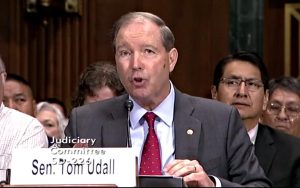
By Mark Oswald | Journal Staff Writer
abqjournal.com | Sunday, January 13th, 2019 at 12:01am
U.S. Sen. Tom Udall is encouraging Gov. Michelle Lujan Grisham’s new administration to reconsider a state government decision made just before she took office Jan. 1 that changes how radioactive waste volume is measured at the Waste Isolation Pilot Plant, in effect allowing more waste to placed in the underground repository near Carlsbad.
Udall said last week that limits on how much waste WIPP can hold were critical to federal-state negotiations that led to WIPP’s creation “and were a major reason New Mexico agreed to this mission in the first place.”
“I am encouraging the new administration to take a hard look at this action, and hopeful that it will pause and reconsider this last-minute change that has major ramifications for our state,” the senator said in an email statement.
The controversial state permit modification for WIPP, approved by then-New Mexico Environment Department Secretary Butch Tongate on Dec. 21, changes the way waste volume is calculated to exclude empty space inside waste packaging. With the alteration, WIPP becomes only about a third full instead of 50 percent full.
Continue reading
More Nuclear Waste Coming to New Mexico
Albuquerque Journal
By Mark Oswald / Journal Staff Writer
Sunday, January 13th, 2019 at 12:01am
U.S. Sen. Tom Udall is encouraging Gov. Michelle Lujan Grisham’s new administration to reconsider a state government decision made just before she took office Jan. 1 that changes how radioactive waste volume is measured at the Waste Isolation Pilot Plant, in effect allowing more waste to placed in the underground repository near Carlsbad.
Udall said last week that limits on how much waste WIPP can hold were critical to federal-state negotiations that led to WIPP’s creation “and were a major reason New Mexico agreed to this mission in the first place.”
An inspector monitors radiations around containers at Los Alamos National Laboratory in 2003 prior to shipping nuclear waste to the Waste Isolation Pilot Plant near Carlsbad. New Mexican file photo; Drums of transuranic waste are stored inside a salt cavern at the Waste Isolation Pilot Plant in Carlsbad in 2006. Los Angeles Times file photo
By Rebecca Moss rmoss@sfnewmexican.com
santafenewmexican.com | Jan 5, 2019 Updated Jan 6, 2019
In the final days of Republican Gov. Susana Martinez's administration, the state Environment Department approved a controversial change to how federal officials measure the amount of nuclear waste buried some 2,000 feet underground in Southern New Mexico salt beds.
Proponents of the change say it merely clarifies that the storage site will measure the actual volume of transuranic waste deposited there rather than the volume of the massive exterior waste drums, called overpack containers — and the air inside. But critics say the result will be an increase in the quantity of material stored at the U.S. Department of Energy's Waste Isolation Pilot Plant near Carlsbad.
Several nuclear watchdog groups, which say they intend to appeal the decision, also fear the change in WIPP's hazardous waste permit from the state could open the door to allowing high-level nuclear waste to be brought into New Mexico.
Jon Kyl Voted for New Nukes After Taking Payments From Nuclear Company
The senator-turned-lobbyist-turned-senator-turned-lobbyist had a paid board seat at one nuclear company and lobbied for two others. Then he joined the Senate.
WASHINGTON, DC – SEPTEMBER 05: U.S. Sen. John Kyl (R-AZ) awaits Vice President Mike Pence before a mock swear-in ceremony on September 5, 2018 in Washington, DC. The former senator Kyl was tapped by Arizona Gov. Doug Ducey to replace the late Sen. John McCain. (Photo by Zach Gibson/Getty Images)By Alex Kotch readsludge.com | JAN 10, 2019 4:10PM EST
After almost 30 years of a program to clean up dangerous defense waste at the Hanford nuclear site in southeastern Washington, the Department of Energy now wants to change the rules to make the job easier and save money. If approved, the proposal poses new dangers to the health and safety of people and the environment — not just in southeastern Washington, but at nuclear sites around the country.
After Sen. John McCain’s death in August 2018, Arizona Gov. Doug Ducey appointed former Republican Senator Jon Kyl to replace him—despite Kyl having spent years lobbying his former colleagues for an array of defense, utility, nuclear, tech, and social media companies that have business before the chamber. Government watchdogs warned of potential ethics issues, but Kyl was allowed to step aside from his K Street job and work on legislation without acknowledging conflicts of interest or recusing himself.
News broke on Monday that Kyl is rejoining his previous employer, lobbying firm Covington & Burling, after his four-month stint in the Senate.
Renew Nuclear Arms Control, Don’t Destroy It
By Andrew Lichterman and John Burroughs
Andrew Lichterman is Senior Research Analyst for Western States Legal Foundation, based in Oakland, California. John Burroughs is Executive Director of Lawyers Committee on Nuclear Policy, based in New York City.
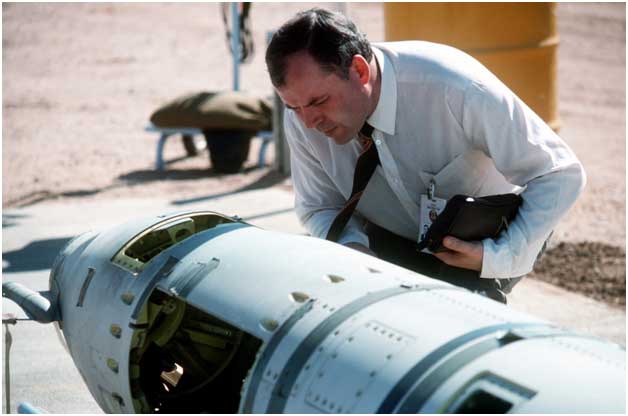
ipsnews.net | NEW YORK, Jan 2 2019 (IPS)
A hard-earned lesson of the Cold War is that arms control reduces the risk of nuclear war by limiting dangerous deployments and, even more important, by creating channels of communication and understanding. But President Donald Trump and his National Security Advisor John Bolton appear to have forgotten, or never learned, that lesson.
In late October, Trump announced an intent to withdraw from the Intermediate-Range Nuclear Forces (INF) Treaty. Secretary of State Mike Pompeo subsequently stated that the US will suspend implementation of the treaty in early February. While US signals have been mixed, initiation of withdrawal at that point or soon thereafter appears likely.
Don’t let feds change the rules for cleaning up Hanford nuclear waste
The public can comment on the U.S. Department of Energy’s proposed changes to Hanford nuclear waste cleanup rules until Jan. 9.
A sign warns of high levels of radiation near a valve at the “C” tank farm of the Hanford Nuclear Reservation near Richland. (AP Photo / Ted S. Warren, 2014)By Tom Carpenter
NukeWatch NM and Hanford Challenge are both members of the Alliance for Nuclear Accountability.
seattletimes.com | Originally published January 2, 2019 at 3:11 pm
After almost 30 years of a program to clean up dangerous defense waste at the Hanford nuclear site in southeastern Washington, the Department of Energy now wants to change the rules to make the job easier and save money. If approved, the proposal poses new dangers to the health and safety of people and the environment — not just in southeastern Washington, but at nuclear sites around the country.
In 1943, the U.S. government built the massive complex at Hanford to manufacture plutonium for nuclear weapons. When defense production ceased in 1986, its nine reactors had produced enough material for 60,000 atomic bombs. What remains is North America’s most contaminated site — more than half a billion gallons of nuclear waste and toxic chemicals stored in leaking tanks and dumped into the ground.
New LANL director: Community relations is a priority
BY MARK OSWALD / JOURNAL STAFF WRITER
Sunday, January 6th, 2019 at 12:02am
The new director of Los Alamos National Laboratory says that, along with the lab’s nuclear weapons missions, its science and engineering efforts, and upgrading operational functions, community relations will be a key piece of LANL’s agenda under new operator Triad National Security, LLC.
LANL’s ex-operator cited for another safety violation
BY MARK OSWALD / JOURNAL STAFF WRITER
Friday, January 4th, 2019 at 11:02pm
SANTA FE – The nuclear security wing of U.S. Department of Energy has issued preliminary notice of a “serious” safety violation for a 2017 mishap at Los Alamos National Laboratory that the DOE previously described as a “near miss to a fatality.”
Vladimir Putin on nuclear war: U.S. is pushing world ‘closer to a very dangerous line
The U.S. is threatening to suspend a Cold War treaty limiting medium-range missiles because it says one of Russia’s weapons violates the agreement.
By Yuliya Talmazan and Alexander Smith
Russian President Vladimir Putin warned Thursday that the world is underestimating the threat of nuclear war and blamed the U.S. for risking a collapse in global arms controls.
nbcnews.com | Dec. 20, 2018 / 1:16 AM PST / Updated Dec. 20, 2018 / 7:04 AM PST
The U.S. is threatening to suspend a Cold War treaty limiting medium-range missiles because it says one of Russia’s weapons violates the agreement.
During his annual marathon news conference Thursday, Putin insisted that Washington was to blame. Most experts agree Russia has been violating the Intermediate-Range Nuclear Forces Treaty, signed in 1987 by President Ronald Reagan and Soviet leader Mikhail Gorbachev.
However, many of those same analysts have criticized President Donald Trump for walking away from the INF Treaty. They argue that quitting it won’t bring Russia into line, and instead could trigger an arms race with ground-based nuclear missiles returning to Europe for the first time in decades.Continue reading
Don’t Tear Up This Treaty
Arms control isn’t perfect. But abandoning treaties without a plan for the future is dangerous.
The Editorial Board
The editorial board represents the opinions of the board, its editor and the publisher. It is separate from the newsroom and the Op-Ed section.
nytimes.com | Dec. 15, 2018
Every American president from John F. Kennedy to Barack Obama has successfully negotiated an agreement with the Soviet Union, or the Russian federation, to reduce the threat from both countries’ vast nuclear arsenals. More than a dozen treaties limiting nuclear testing, nuclear weapons, activities in outer space and missile defense have been part of this mix.
The need for such restraint is irrefutable: No weapons are more lethal and potentially more destabilizing to the world than those that have earned the moniker “city killers.”Continue reading
Letter from 26 Senators Responding to Trump’s Nuclear Policy

FOR IMMEDIATE RELEASE: Thursday, December 13, 2018
FOLLOWING PRESIDENT TRUMP’S ALARMING DECISION TO DEVELOP NEW NUCLEAR WEAPONS WHILE ALSO MOVING TO UNILATERALLY ABANDON THE BIPARTISAN NUCLEAR TREATIES THAT HAVE HELPED KEEP THE WORLD SAFE FROM NUCLEAR WAR FOR DECADES, SENATORS GILLIBRAND, MERKLEY, WARREN, MARKEY, FEINSTEIN, KLOBUCHAR LEAD GROUP OF 26 SENATORS IN CALLING ON PRESIDENT TRUMP TO WORK TO PRESERVE THESE VITALLY IMPORTANT TREATIES, AVOID DRAGGING OUR COUNTRY INTO A DANGEROUS NEW NUCLEAR ARMS RACE WITH RUSSIA
Senators: “Your Administration’s Efforts to Double Down on New, Unnecessary Nuclear Weapons While Scrapping Mutually Beneficial Treaties Risks the United States Sliding Into Another Arms Race with Russia and Erodes U.S. Nonproliferation Efforts Around the World”
Russia Just Sent Two Nuclear-Capable Bombers to Venezuela
By VLADIMIR ISACHENKOV / AP time.com
(MOSCOW) — Two Russian nuclear-capable strategic bombers arrived in Venezuela on Monday, a deployment that comes amid soaring Russia-U.S. tensions.
Russia’s Defense Ministry said a pair Tu-160 bombers landed at Maiquetia airport outside Caracas on Monday following a 10,000-kilometer (6,200-mile) flight. It didn’t say if the bombers were carrying any weapons and didn’t say how long they will stay in Venezuela.
ANA Press Release
Alliance for Nuclear Accountability
immediate release: Tuesday, November 27, 2018
Watchdog groups call for Congress to protect nuclear weapons communities—stop DOE limitations on Safety Board
Watchdog groups from across the country are insisting the Department of Energy withdraw DOE Order 140.1, a controversial order that would compromise safety at dozens of facilities in the US nuclear weapons complex, and are asking key Congressional committees to annul the revised order and preserve the critically important prerogatives of the Defense Nuclear Facilities Safety Board (DNFSB).
 DOE MUST RESTORE DEFENSE NUCLEAR FACILITIES SAFETY BOARD ACCESS TO INFORMATION, NUCLEAR SECURITY FACILITIES, AND PERSONNEL
DOE MUST RESTORE DEFENSE NUCLEAR FACILITIES SAFETY BOARD ACCESS TO INFORMATION, NUCLEAR SECURITY FACILITIES, AND PERSONNEL
What’s HappenedOn May 14, 2018, the Department of Energy (DOE) Deputy Secretary approved DOE Order 140.1 Interface with the Defense Nuclear Facilities Safety Board, which limits release of information, limits the DNFSB’s access to nuclear security sites, and personnel. The impacts are already being felt by Congress, the Board, DOE contractors and workers, and in communities located near some of the most dangerous nuclear facilities across the nation. |
ANA’s MessageThe Alliance for Nuclear Accountability has reviewed DOE Order 140.1 and believes it imposes a level of constraint on DNFSB that jeopardizes the important mission of the Safety Board. In fact, it may well violate the legislation that established the Board. ANA groups and the public at major DOE sites have come to rely on the Safety Board’s expertise to identify and hold accountable the DOE and National Nuclear Security Administration for worker and public safety related issues. |
ANA Letter to Congress
November 27, 2018
RE: DOE Order 140.1 should be annulled by Congress
Dear House/Senate Armed Services Committee Members:
We are writing to ask that you annul the May 2018 DOE Order 140.1, Interface with the Defense Nuclear Facilities Safety Board and reinstate the previous DOE Order 140.1.
The Defense Nuclear Facilities Safety Board (“DNFSB” or “Safety Board”) was established by Congress in September 1988 (Public Law 100-456) in response to growing concerns about health and safety protection that the Department of Energy (“DOE”) was providing the public and workers at defense nuclear facilities. In so doing, Congress sought to provide the general public with an independent source of critical oversight to add assurance that DOE’s defense nuclear facilities are safely designed, constructed, operated, and decommissioned. Over the past 30 years, the Safety Board’s authority and funding has been supported by Congress on a bi-partisan basis.
Self-reported violations at LANL increase three-fold in a year
By Sarah Halasz Graham
An 85-gallon drum of radioactive waste leaked into its secondary container. Nearly two dozen waste containers were either mislabeled or not labeled at all. Officials failed to conduct mandated hazardous waste inspections.
During Los Alamos National Laboratory’s most recent fiscal year, officials logged 69 instances of noncompliance with the federal permit that allows the facility to store, manage and treat hazardous waste, according to a newly released annual report that details the violations.
European diplomats mount last-ditch effort to stop US scrapping INF treaty
BY JULIAN BORGER in Washington |
theguardian.com
Sun 18 Nov 2018 03.00 EST Last modified on Sun 18 Nov 2018 10.52 EST
– 1987 treaty has kept nuclear weapons out of Europe
– Trump announced withdrawal from deal with Russia in October
European officials are seeking to act as intermediaries between Russia and the US in the hope of salvaging a cold war-era arms control treaty that Donald Trump has threatened to scrap.
However, the diplomats involved are not confident of success in the effort to save the 1987 Intermediate-range Nuclear Forces (INF) treaty. Although they have the support of senior officials in the US defence and state departments, they face opposition from the White House, particularly from the national security adviser, John Bolton.
Incoming HASC Chair: Scale Back Plans for New Nukes
BY MARCUS WEISGERBER defenseone.com
NOVEMBER 14, 2018
Rep. Adam Smith laid out new terms for a debate over the Pentagon’s plans to expand the military’s nuclear arsenal.
The incoming chairman of the House Armed Services Committee is taking aim at the Trump administration’s plans to expand America’s nuclear arsenal.
While Democrats will only control one chamber of Congress for the next two years, Rep. Adam Smith, D-Wash., called for lawmakers to “totally redo the Nuclear Posture Review,” the administration’s blueprint for replacing Cold War-era nuclear weapons with newer ones envisioned to be aroundContinue reading
Trump’s Defense Spending Is Out of Control, and Poised to Get Worse
BY MATT TAIBBI rollingstone.com
Using a time-honored trick, a bipartisan congressional panel argues we should boost the president’s record defense bill even more
A bipartisan commission has determined that President Trump’s recent record defense bill is insufficiently massive to keep America safe, and we should spend more, while cutting “entitlements.”
The National Defense Strategy Commission concluded the Department of Defense was too focused on “efficiency” and needed to accept “greater cost and risk” to search for “leap-ahead technologies” to help the U.S. maintain superiority.
Nuclear fallout: $15.5 billion in compensation and counting
BY JAMIE GREY & LEE ZURIK mysuncoast.com
November 12, 2018 at 1:00 PM EST – Updated November 12 at 10:54 AM
LOS ALAMOS, NEW MEXICO (InvestigateTV) – Clear, plastic water bottles, with the caps all slightly twisted open, fill a small refrigerator under Gilbert Mondragon’s kitchen counter. The lids all loosened by his 4- and 6-year old daughters because, at just 38, Mondragon suffers from limited mobility and strength. He blames his conditions on years of exposure to chemicals and radiation at the facility that produced the world’s first atomic bomb: Los Alamos National Laboratory. Mondragon is hardly alone in his thinking…
Continue reading
LANL Groundwater Discharge Permit Hearing Underway
BY TRIS DEROMA – lamonitor.com |
In opening testimony at a groundwater discharge permit hearing Wednesday, attorneys for a Los Alamos National Laboratory contractor said spraying the ground with water with remediated levels of chromium and RDX is environmentally safe. Chromium and RDX are known carcinogens. The chemicals are from contamination plumes found on the grounds of the laboratory in the 2000s.
Continue reading
NNMCAB Discusses Potential Impacts of DOE’s Possible Redefinition Of High-Level Radioactive Waste
BY MAIRE O’NEILL
The Northern New Mexico Citizens Advisory Board is asking Department of Energy (DOE) Environment Management and New Mexico Environment Department to address the potential impacts of the possible redefinition of high-level radioactive waste (HLW) for the board.
Donald Trump Welcomes In the Age of “Usable” Nuclear Weapons
BY James Carroll, TomDispatch – truthout.org |
Nuclear News Archives – 2021
Nothing Found
It seems we can’t find what you’re looking for. Perhaps searching can help.
Nuclear News Archives – 2020
Nothing Found
It seems we can’t find what you’re looking for. Perhaps searching can help.
Nuclear News Archives – 2019
Nothing Found
It seems we can’t find what you’re looking for. Perhaps searching can help.
Nuclear News Archives – 2018
Nothing Found
It seems we can’t find what you’re looking for. Perhaps searching can help.



